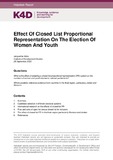| dc.contributor.author | Hicks, Jacqueline | |
| dc.date.accessioned | 2022-10-10T10:29:55Z | |
| dc.date.available | 2022-10-10T10:29:55Z | |
| dc.date.issued | 2022-09-28 | |
| dc.identifier.citation | Hicks, J. (2022). Effect of closed list proportional representation on the election of women and youth. K4D Helpdesk Report. Institute of Development Studies. DOI: 10.19088/K4D.2022.155 | en |
| dc.identifier.uri | https://opendocs.ids.ac.uk/opendocs/handle/20.500.12413/17699 | |
| dc.description.abstract | There is evidence that a closed list proportional representation (PR) system increases the election of female and youth candidates, particularly when accompanied by a type of quota known as a placement mandate.
The exact effects of a closed list system on the election of women and youth depends on a number of other factors, including:
• What is being compared
• The type of sanction if a mandated quota is violated
• The degree to which bias against women and youth exists in society
• and party “magnitudes”)
• If there are tandem quotas for women and youth
The degree to which inclusive electoral reforms lead to genuine change is dependent on context and is highly dynamic. The research undertaken for this rapid review found some approaches to this question, including looking at the inclusion of women in senior parliament and party roles after they gain seats through quotas, and the backgrounds of the women who gain seats through quotas. Research from Morocco, Jordan and Tunisia shows that there is nothing automatic about gaining positions of authority or influence for women once elected.
State of the evidence: This topic has been heavily researched since the 1990s, and the evidence found during the course of this rapid review is a small proportion of what exists. This review relies mostly on academic research, with some additional input from international think-tanks on electoral regulation. There is comparatively much less research on youth inclusion than on the inclusion of women. | en |
| dc.description.sponsorship | Foreign, Commonwealth and Development Office (FCDO) | en |
| dc.language.iso | en | en |
| dc.publisher | Institute of Development Studies | en |
| dc.relation.ispartofseries | K4D Helpdesk Report;1219 | |
| dc.rights.uri | https://www.nationalarchives.gov.uk/doc/open-government-licence/version/3/ | en |
| dc.subject | Gender | en |
| dc.subject | Participation | en |
| dc.subject | Politics and Power | en |
| dc.title | Effect of Closed List Proportional Representation on the Election of Women and Youth | en |
| dc.type | Helpdesk | en |
| dc.rights.holder | © Crown copyright 2022 | en |
| dc.identifier.doi | 10.19088/K4D.2022.155 | |
| dcterms.dateAccepted | 2022-09-28 | |
| rioxxterms.funder | Default funder | en |
| rioxxterms.identifier.project | K4D | en |
| rioxxterms.version | VoR | en |
| rioxxterms.versionofrecord | 10.19088/K4D.2022.155 | en |
| rioxxterms.funder.project | 42a141a4-4b80-406f-9c57-3bb186f136c1 | en |

